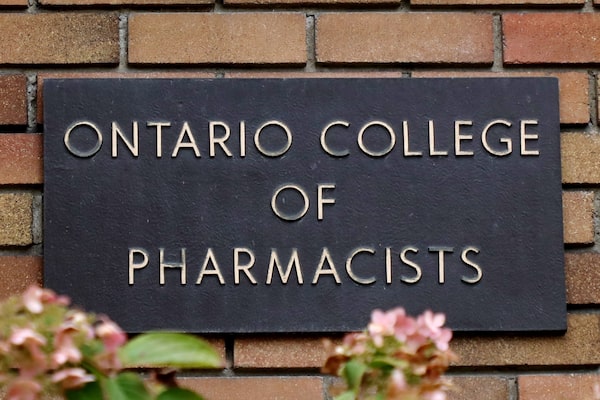
A sign for the Ontario College of Pharmacists is seen at its headquarters in Toronto in November, 2019.Colin Perkel/The Canadian Press
The Ontario College of Pharmacists is stepping up the profession’s criticism of exclusivity deals between pharmacies and insurers, and also pushing for new regulatory restrictions on the practice.
At a Monday board meeting, the directors of the college, a self-regulatory body for the profession, also heard concerns about pharmacists being pressed by corporate pharmacy owners to bill for unnecessary services.
The exclusivity deals, known as preferred pharmacy (or provider) networks, or PPNs, are increasingly widespread in the private health insurance industry, though the terms of the agreements can vary.
Manulife Financial Group MFC-T, Canada’s largest insurer, recently announced – and then cancelled – one such deal with Shoppers Drug Mart that would have required chronically ill patients to buy their medication only from pharmacies owned by Loblaw Cos. Ltd. L-T, including Shoppers.
The college’s board voted Monday to draft a position statement critical of PPNs, after being briefed on pharmacists’ concerns that the deals restrict patient autonomy and may limit some patients’ access to treatment.
“Patients are making decisions to cut ties with their current pharmacist to ensure their essential prescription drugs are covered,” said a staff report issued to the board ahead of the vote.
The board also directed the college’s staff to begin working with the Ontario Ministry of Health to develop new regulations that would restrict use of PPNs in the province. The staff report cites as a model Quebec legislation that says no insurance plan may restrict a patient’s right to choose their pharmacist.
Michael Nashat, a director of OnPharm-United – a network of more than 600 independent pharmacies – welcomed the news, and said the board’s decision was an important change of direction for the college, which had decided in 2018 not to pursue regulatory changes that would restrict PPNs.
Jim Danahy, chief executive of retail consultancy CustomerLAB, which advises the industry, said it is significant that the college, the largest of Canada’s provincial regulatory bodies for pharmacists, has publicly recognized that there is a problem that needs to be addressed.
“I think this is groundbreaking. They have emphasized a sense of urgency,” Mr. Danahy said. “What is going to be really important is scrutiny on what the position statement includes.”
Mr. Danahy said he believes that legislation, such as Quebec’s, is necessary to protect patients’ ability to choose where they receive health services, including pharmacy services. He added that it was not clear whether the college’s board will be explicitly recommending such legislation to the government.
The board also heard that thousands of the province’s pharmacists were feeling pressure from corporate pharmacy owners to increase revenue. College staff surveyed 4,309 pharmacy professionals in March, representing 20 per cent of Ontario’s work force and a third of all those in the province employed by corporate pharmacies.
About 70 per cent of respondents reported feeling workplace pressure to bill for unnecessary services. The most commonly cited instances of this included MedsCheck calls, in which pharmacists call patients to review their medications; and minor-ailment treatment, a newly approved power for pharmacists, under which they prescribe drugs for common illnesses, such as pink eye. In both cases, the services are billed to Ontario’s public health insurance plan.
“The numbers are staggering,” Susan James, the director of quality at the college, said during a presentation to the board on Monday.
The survey included more than 2,000 professionals who worked at Loblaw-owned pharmacies, and almost 400 at Rexall. Nearly all of them reported concerns about unnecessary billing.
The college also conducted four virtual town halls this month, where many pharmacists reported anger and frustration over the pressure they said they were facing. They said it most often came from non-professionals and those working in corporate offices.
Board chair James Morrison said he attended one of the town halls and was shocked by the stories they shared. “What I saw was hundreds of registrants expressing that they are subject to quotas on publicly funded pharmacy services,” he told the board.
Last month, the CBC reported that former Shoppers Drug Mart pharmacists had said they faced pressure to conduct MedsCheck calls, something Loblaw has denied.
“The decision to deliver a professional service has always been and must always be made by the pharmacist,” Loblaw spokesperson Catherine Thomas wrote in a statement on Monday. “… That said, we are listening to the concerns raised recently and are working with our teams to ensure we take a collaborative approach to patient care.”
Michelle Lee-Gracey, a spokesperson for Rexall’s parent company, McKesson Canada, said in a statement that “under no circumstances would Rexall encourage the provision of any clinical services that are not in the best interests of the patient. Our pharmacists adhere to the highest professional standards, which include ensuring the clinical appropriateness of any patient interventions and acting in the best interests of the patient using their professional judgement.”
Both McKesson’s and Loblaw’s statements noted that medication reviews such as the Ontario MedsCheck program are important for improving patient safety and adherence to medications.